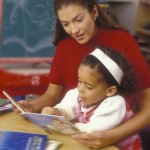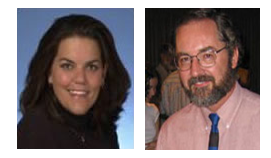ALL Students Can Be Readers & Writers
 Current research surrounding literacy for students with significant disabilities has demonstrated that, with appropriate support and instruction, all students can be readers and writers. Traditionally, the approach has been a readiness model stating that literacy should be learned in a pre-determined, sequential manner that requires certain skills to be in place before the student can advance to the next level. The rigidity of this model has created barriers that many of our students can not overcome. The current view on literacy learning, however, focuses on enhancing communication and language opportunities to help students make connections and learn to use print in a meaningful way.
Current research surrounding literacy for students with significant disabilities has demonstrated that, with appropriate support and instruction, all students can be readers and writers. Traditionally, the approach has been a readiness model stating that literacy should be learned in a pre-determined, sequential manner that requires certain skills to be in place before the student can advance to the next level. The rigidity of this model has created barriers that many of our students can not overcome. The current view on literacy learning, however, focuses on enhancing communication and language opportunities to help students make connections and learn to use print in a meaningful way.
This past August, educators attended the Emergent Literacy Academy at Oakland Schools for five days of intense learning. The presenters, Dr. Karen Erickson and Dr. David Koppenhaver, demonstrated the effectiveness of implementing a balanced literacy approach for students with the most significant disabilities, resulting in a life-altering skill: to be literate.
Like all students, individuals with significant cognitive disabilities need ongoing, comprehensive instruction in reading, writing, speaking, listening and language.
Each day, students at an emerging level of literacy learning need to be instructed in the following areas:
- Shared reading experiences to increase engagement and interaction
- Predictable chart writing to build concepts about print, word identification and communication skills
- Alphabet and Phonological Awareness to teach letter-shape/writing recognition, letter-name knowledge, and letter-sound knowledge
- Independent writing opportunities to help students make the connection that writing is purposeful
- Independent reading opportunities to allow students to explore text they are interested in reading
This document is currently the most comprehensive review of the research pertaining to literacy in students with significant disabilities.
Important conclusions of emergent literacy research include:
- The process of learning to read and write is a continuum that begins at birth.
- Children learn written language through active engagement with their world.
- Emergent literacy behaviors are fleeting and variable depending on text, task, and environment.
- The functions of print are as integral to literacy as the forms.
For more information and resources, go to The Center for Literacy Disabilities Studies , a website devoted to addressing the literacy learning needs of persons with disabilities of all ages. This website contains articles, white papers, Deaf/Blind resources, and core vocabulary information for students with complex communication needs.

Colleen Meszler is a Special Education Consultant in the Professional Learning Unit of the Department of Special Education. She supports public school special educators in their work to close the achievement gap between students with and without IEPs. Specifically, she facilitates the professional learning of special educators in the provision of emergent and conventional literacy instruction to students with moderate to significant cognitive disabilities. The emphasis is on instructional practices for pre-K through post-high students who are educated to alternate achievement standards and assessed through the Alternate Assessment.
Consultants' Corner

